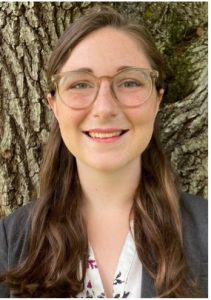 Recent Materials Science & Engineering undergraduate, Emma Steinebronn, was awarded a fellowship from the National Science Foundation (NSF) Graduate Research Fellowship Program (GRFP).
Recent Materials Science & Engineering undergraduate, Emma Steinebronn, was awarded a fellowship from the National Science Foundation (NSF) Graduate Research Fellowship Program (GRFP).
Steinebronn’s research proposal includes a five-year study evaluating induced magnetic fields around semiconducting nanowires as a possible noise source in quantum computing.
Quantum computing, while still a relatively new field, has seen significant advances in the past decade. It offers an alternative to current computers, enabling more complex computing to be conducted faster and with less power. While extremely promising, the most significant issue facing quantum computing today is the inherent noise generated by the component materials. This noise can disrupt the delicate conditions required for quantum computing and result in computing errors.
“Theory indicates that topological nanowires may act as hollow shells of charge. If so, a magnetic field may be forming around these nanowires as current flows through them,” said Steinebronn. “In my research, we explore this potential noise source and how to mitigate it. With success, we could provide a recipe for a topological quantum computing system with lower noise than ever before.”
Steinebronn is originally from Oviedo, Florida, and received her Bachelor of Science degree in Materials Science & Engineering in May 2021. While at UF, she conducted two years of magnetoelectric nanowire research with Jennifer Andrew, Ph.D. She also was selected as a participant for the NSF Research Experience for Undergraduates (REU), studying Fermi surfaces of topological materials with Lu Li, Ph.D. at the University of Michigan. She will pursue her Ph.D. in Physics beginning fall 2021 at Penn State University.
“I am honored to win such a prestigious award. I never thought a future as a Ph.D. student was possible for someone like me, let alone a fully-funded future,” said Steinebronn. “I cannot wait to use this fellowship as a springboard into advancement in the scientific community, both in knowledge and diversity. I also hope to use this opportunity to encourage the many underrepresented groups that a future in science IS possible and equip them with the tools to achieve their dreams.”
The NSF’s Graduate Research Fellowship Program recognizes and supports outstanding graduate students pursuing full-time research-based master’s and doctoral degrees in science, technology, engineering and mathematics (STEM).
